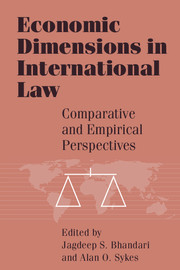Book contents
- Frontmatter
- Contents
- Preface
- Introduction: Economics and international law
- 1 The economics of the most favored nation clause
- 2 The economics of “injury” in antidumping and countervailing duty cases
- 3 The economics of “injury” in antidumping and countervailing duty cases: A reply to Professor Sykes
- 4 Innovations in support of the unitary injury test in U.S. unfair trade cases
- 5 The free trade–fair trade debate: Trade, labor, and the environment
- 6 International conflict and coordination in environmental policies
- 7 Market modernization of law: Economic development through decentralized law
- 8 Toward a positive theory of privatization: Lessons from Soviet-type economies
- 9 New stories on exchange rate policies in transition
- 10 Is deposit insurance inevitable? – lessons from Argentina
- 11 The market for migrants
- 12 The interplay of liquidation and reorganization in the bankruptcy systems of Canada and the United States: The role of screens, gatekeepers, and guillotines
- 13 International political economy approaches to international institutions
- 14 The trade effects of domestic antitrust enforcement
- 15 The Hartford Insurance Company case: Antitrust in the global economy – welfare effects and sovereignty
- 16 Recognition of foreign judgments as a trade law issue: The economics of private international law
- 17 Externalities and extraterritoriality: The law and economics of prescriptive jurisdiction
- Index
6 - International conflict and coordination in environmental policies
Published online by Cambridge University Press: 05 December 2011
- Frontmatter
- Contents
- Preface
- Introduction: Economics and international law
- 1 The economics of the most favored nation clause
- 2 The economics of “injury” in antidumping and countervailing duty cases
- 3 The economics of “injury” in antidumping and countervailing duty cases: A reply to Professor Sykes
- 4 Innovations in support of the unitary injury test in U.S. unfair trade cases
- 5 The free trade–fair trade debate: Trade, labor, and the environment
- 6 International conflict and coordination in environmental policies
- 7 Market modernization of law: Economic development through decentralized law
- 8 Toward a positive theory of privatization: Lessons from Soviet-type economies
- 9 New stories on exchange rate policies in transition
- 10 Is deposit insurance inevitable? – lessons from Argentina
- 11 The market for migrants
- 12 The interplay of liquidation and reorganization in the bankruptcy systems of Canada and the United States: The role of screens, gatekeepers, and guillotines
- 13 International political economy approaches to international institutions
- 14 The trade effects of domestic antitrust enforcement
- 15 The Hartford Insurance Company case: Antitrust in the global economy – welfare effects and sovereignty
- 16 Recognition of foreign judgments as a trade law issue: The economics of private international law
- 17 Externalities and extraterritoriality: The law and economics of prescriptive jurisdiction
- Index
Summary
Introduction
Governments have always shown a propensity to intervene in economic activities, sometimes with good cause, sometimes not. In the past, their interventions have often been regarded as only their own concerns, and not matters for concern by other countries. Globalization of the world economy, however, has made that kind of independence increasingly problematic. On the one hand, the problems that governments seek to address with their interventions themselves increasingly cross national boundaries. And on the other, the interdependence of world markets itself often means that interventions by governments in their own economies will spill over into others, through trade and other forms of international interaction. For both of these reasons, it is becoming increasingly important to examine the interrelationships among government policies in the international setting. In some cases, these interrelationships will lead to conflict among government policies and the need for some international mechanism to resolve that conflict. In other cases, the lack of international coordination among policies may permit individual countries to free-ride on the policies of others and thus prevent optimal solutions to the world's problems from being attained. This chapter will explore both of these issues, in the particular context of a simple problem in environmental policy, and using the tools of simple economic theory.
Environmental policy provides excellent examples of both of the problems that can arise in international policy conflict and coordination. Consider the issue of environmental pollution by producing firms.
- Type
- Chapter
- Information
- Economic Dimensions in International LawComparative and Empirical Perspectives, pp. 248 - 274Publisher: Cambridge University PressPrint publication year: 1998
- 3
- Cited by



